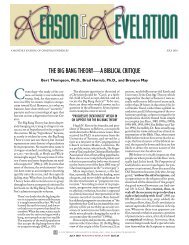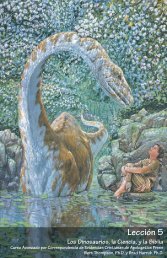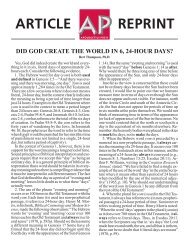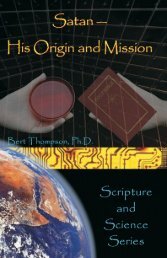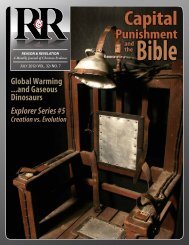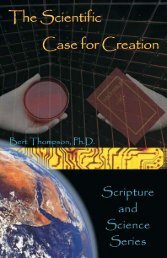The Many Faces, and Causes, of Unbelief - Apologetics Press
The Many Faces, and Causes, of Unbelief - Apologetics Press
The Many Faces, and Causes, of Unbelief - Apologetics Press
You also want an ePaper? Increase the reach of your titles
YUMPU automatically turns print PDFs into web optimized ePapers that Google loves.
Sadly, approximately two years later, law enforcement authorities<br />
in Texas announced that they had discovered the buried,<br />
dismembered bodies <strong>of</strong> Mrs. O’Hair, Jon, <strong>and</strong> Robin, all<br />
three <strong>of</strong> whom had been murdered by two <strong>of</strong> Mrs. O’Hair’s<br />
employees, David Waters (Madalyn’s former <strong>of</strong>fice manager)<br />
<strong>and</strong> David Kerr, both <strong>of</strong> whom are now in prison<br />
It can be said without fear <strong>of</strong> contradiction that “the most<br />
hated woman in America”—who had made it her life’s goal to<br />
oppose God—did not live up to anyone’s expectations, but<br />
undeniably lived down to the level <strong>of</strong> her self-pr<strong>of</strong>essed atheism.<br />
<strong>The</strong> history <strong>of</strong> infidelity, only a brief overview <strong>of</strong> which I<br />
have examined here, documents all too well that she has not<br />
been alone. In his novel, <strong>The</strong> Brothers Karamazov, Russian novelist<br />
Fyodor Dostoevsky had one <strong>of</strong> his characters, Ivan, comment<br />
that if there is no God, everything is permitted. French<br />
atheist <strong>and</strong> existential philosopher, Jean Paul Sartre, opined:<br />
Everything is indeed permitted if God does not exist,<br />
<strong>and</strong> man is in consequence forlorn, for he cannot find<br />
anything to depend upon either within or outside himself....<br />
Nor, on the other h<strong>and</strong>, if God does not exist,<br />
are we provided with any values or comm<strong>and</strong>s that<br />
could legitimize our behavior (1961, p. 485).<br />
As essayist G.K. Chesterton once observed: “When men cease<br />
to believe in God, they do not believe in nothing; they believe<br />
in anything” (as quoted in Bales, 1967, p. 133, emp.<br />
added).<br />
DEISM<br />
<strong>The</strong> concept <strong>of</strong> deism (from the Latin deus, god) had its beginnings<br />
among writers in seventeenth-century Engl<strong>and</strong>, beginning<br />
with Edward Herbert (1581-1648), who later became the<br />
first Baron Herbert <strong>of</strong> Cherbury, <strong>and</strong> who <strong>of</strong>ten is recognized<br />
as the “father <strong>of</strong> deism.” In his 1624 book, De Veritate (On Truth),<br />
Lord Herbert laid out five basic principles <strong>of</strong> deism: “(1) <strong>The</strong><br />
being <strong>of</strong> God; (2) that he is to be worshipped; (3) that piety<br />
<strong>and</strong> moral virtue are the chief parts <strong>of</strong> worship; (4) that God<br />
will pardon our faults on repentance; <strong>and</strong>, (5) that there is a<br />
-30




